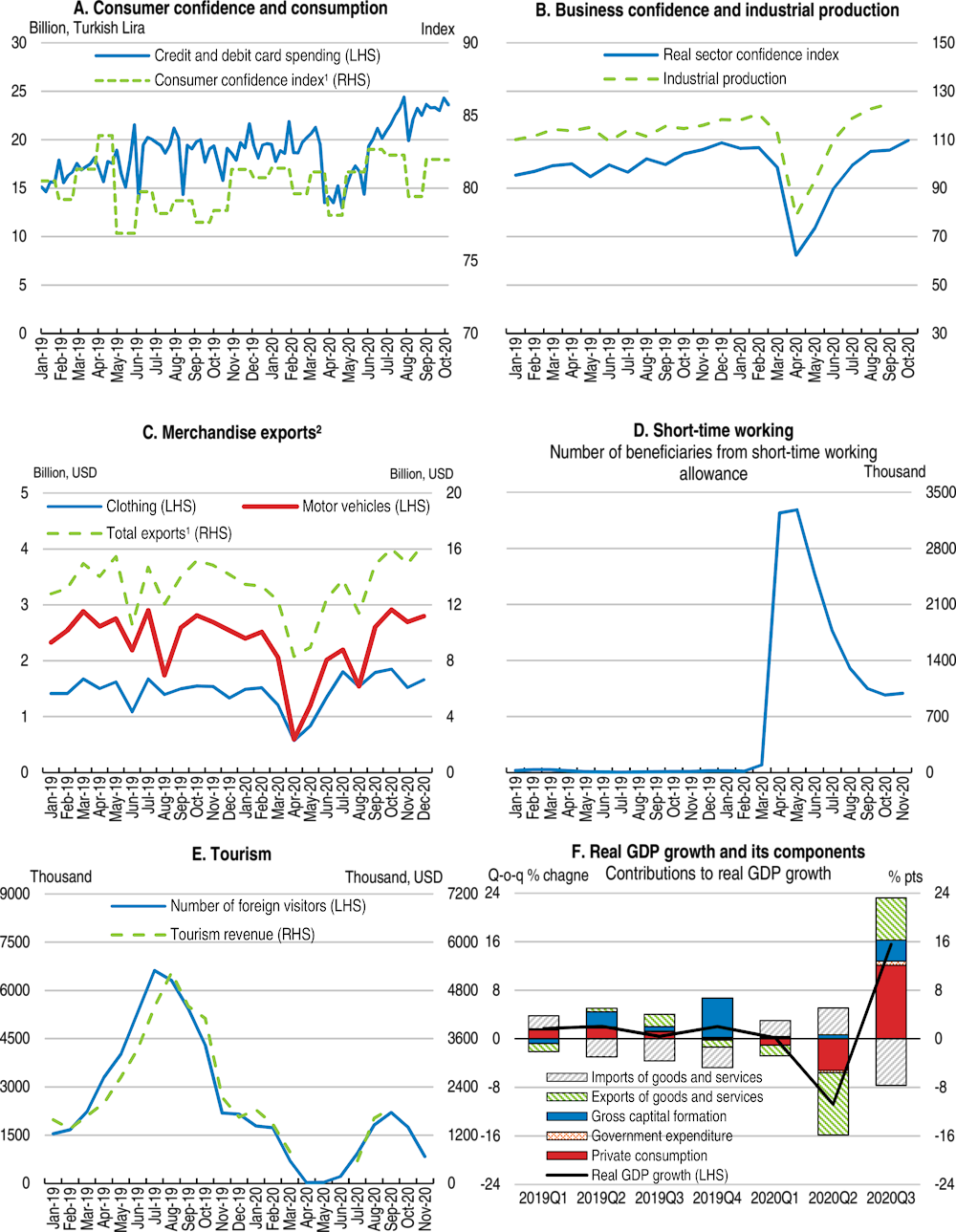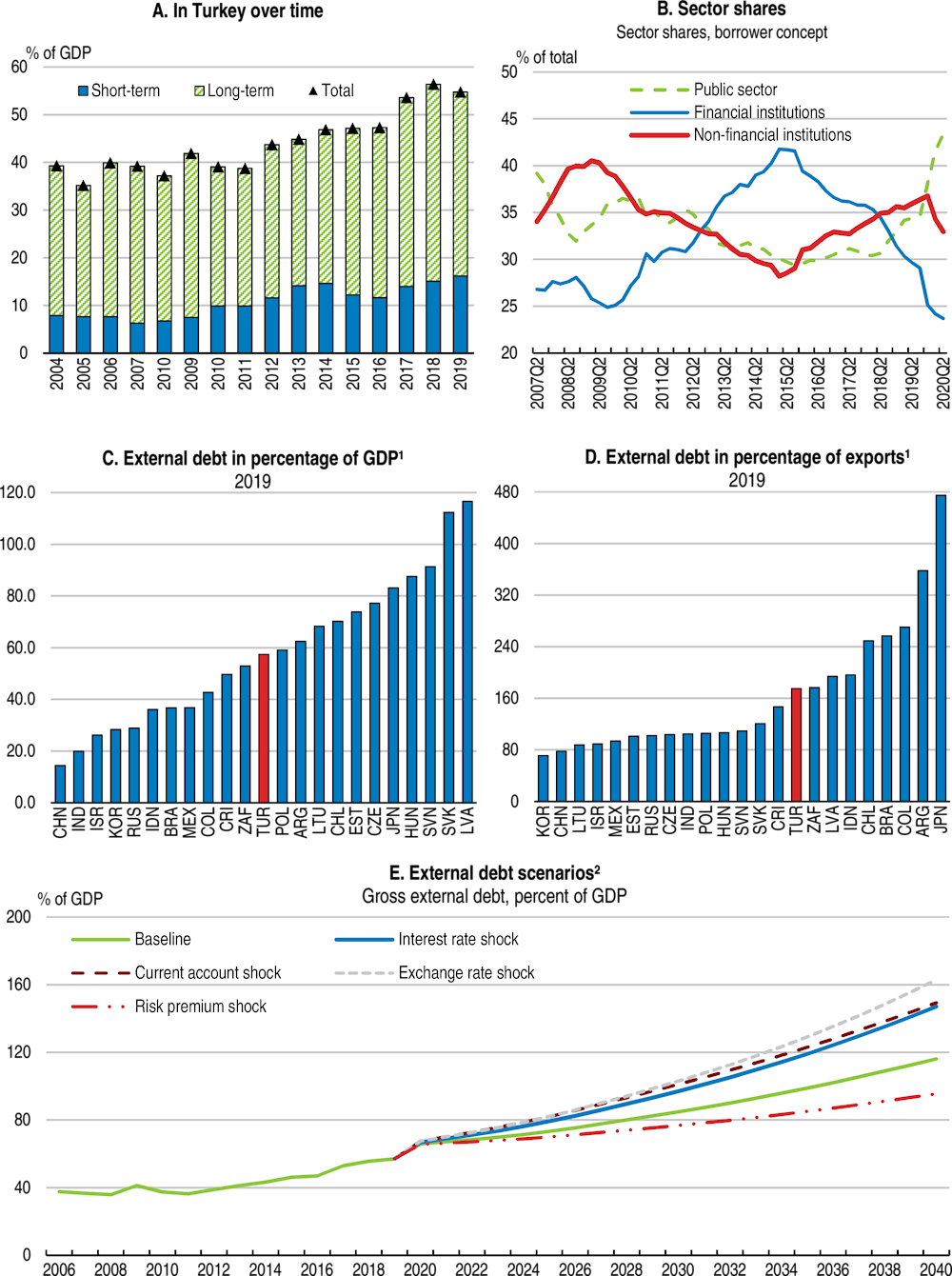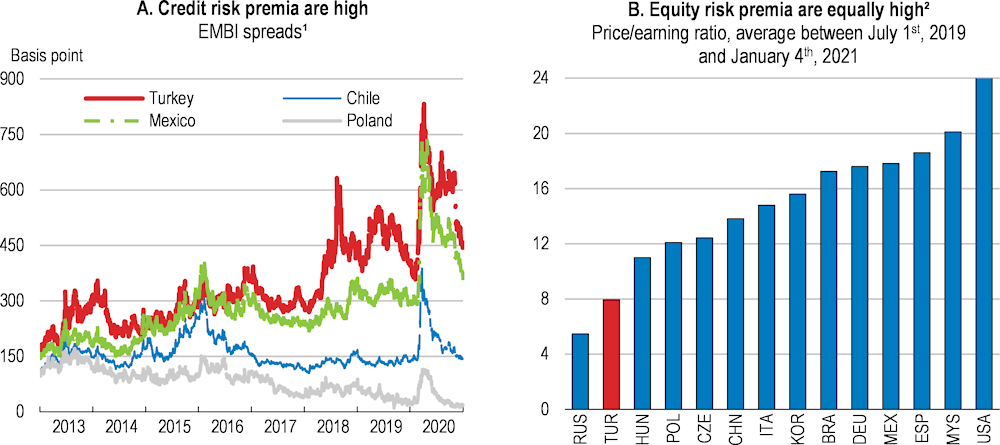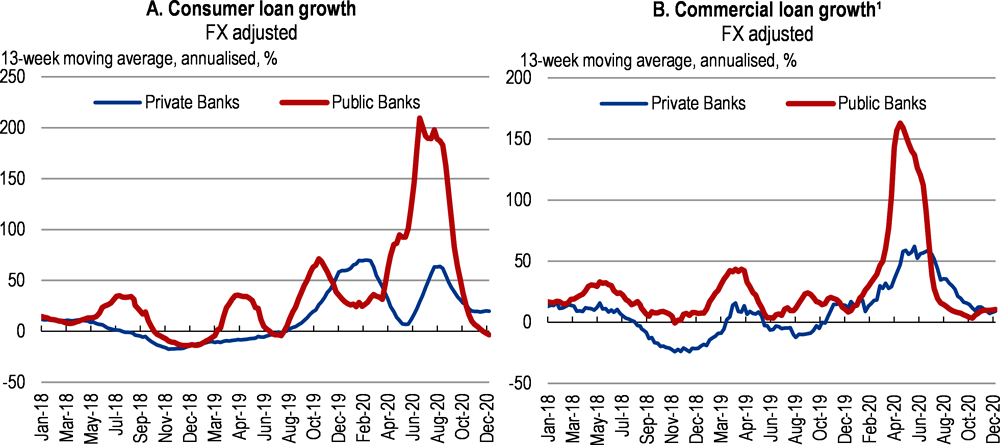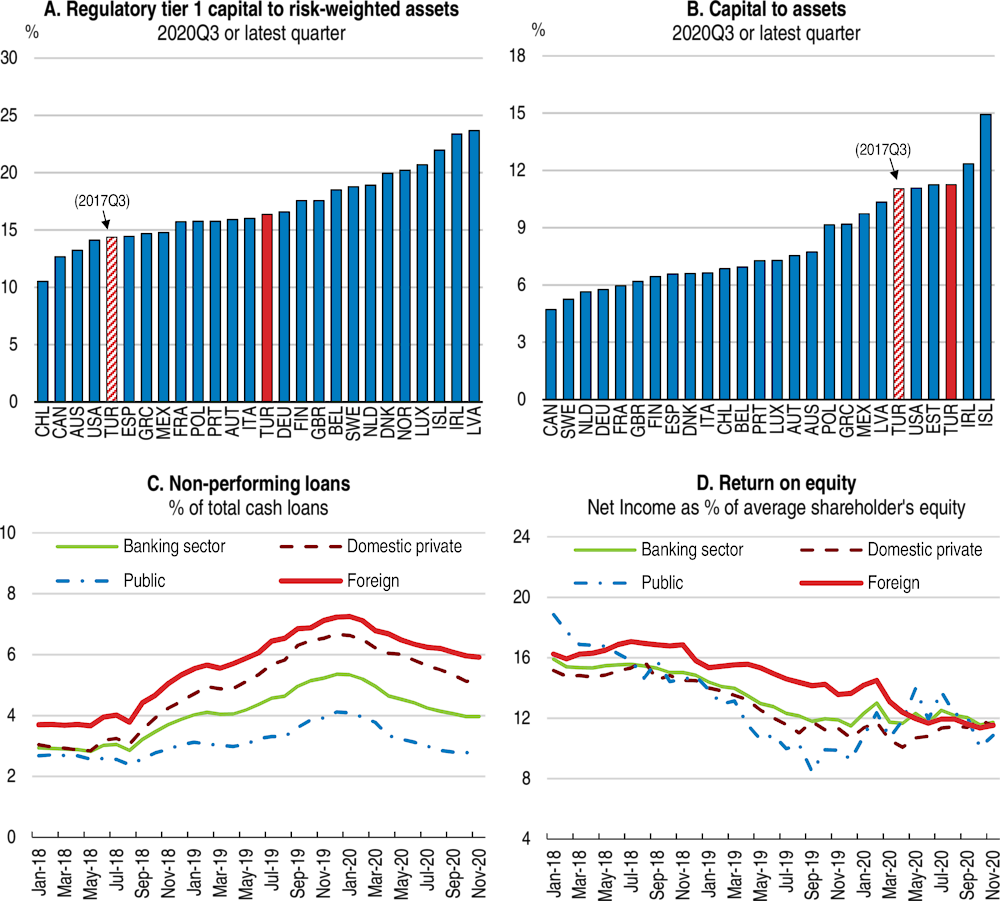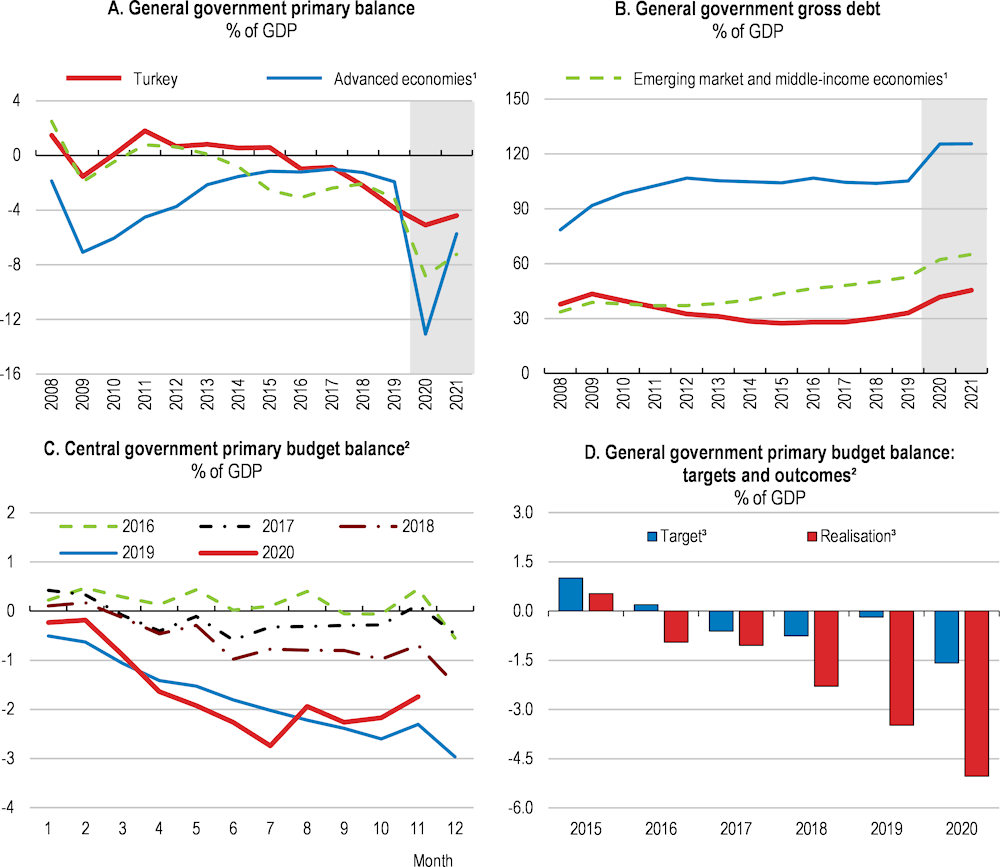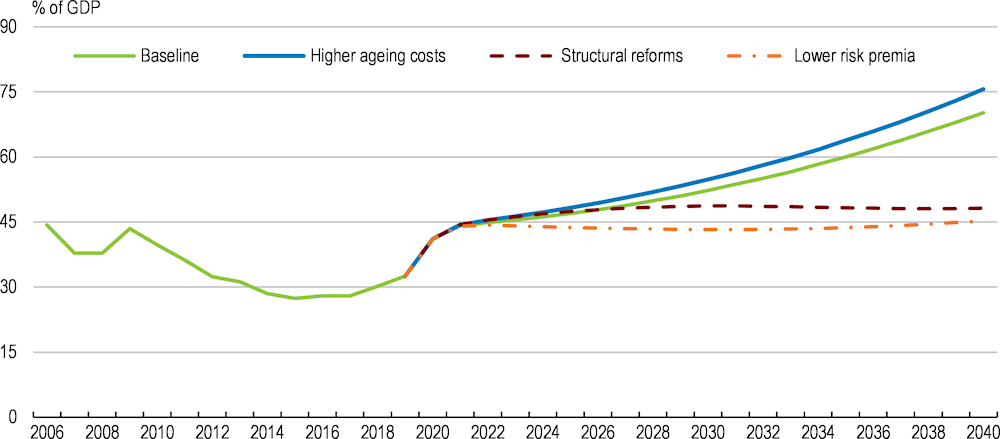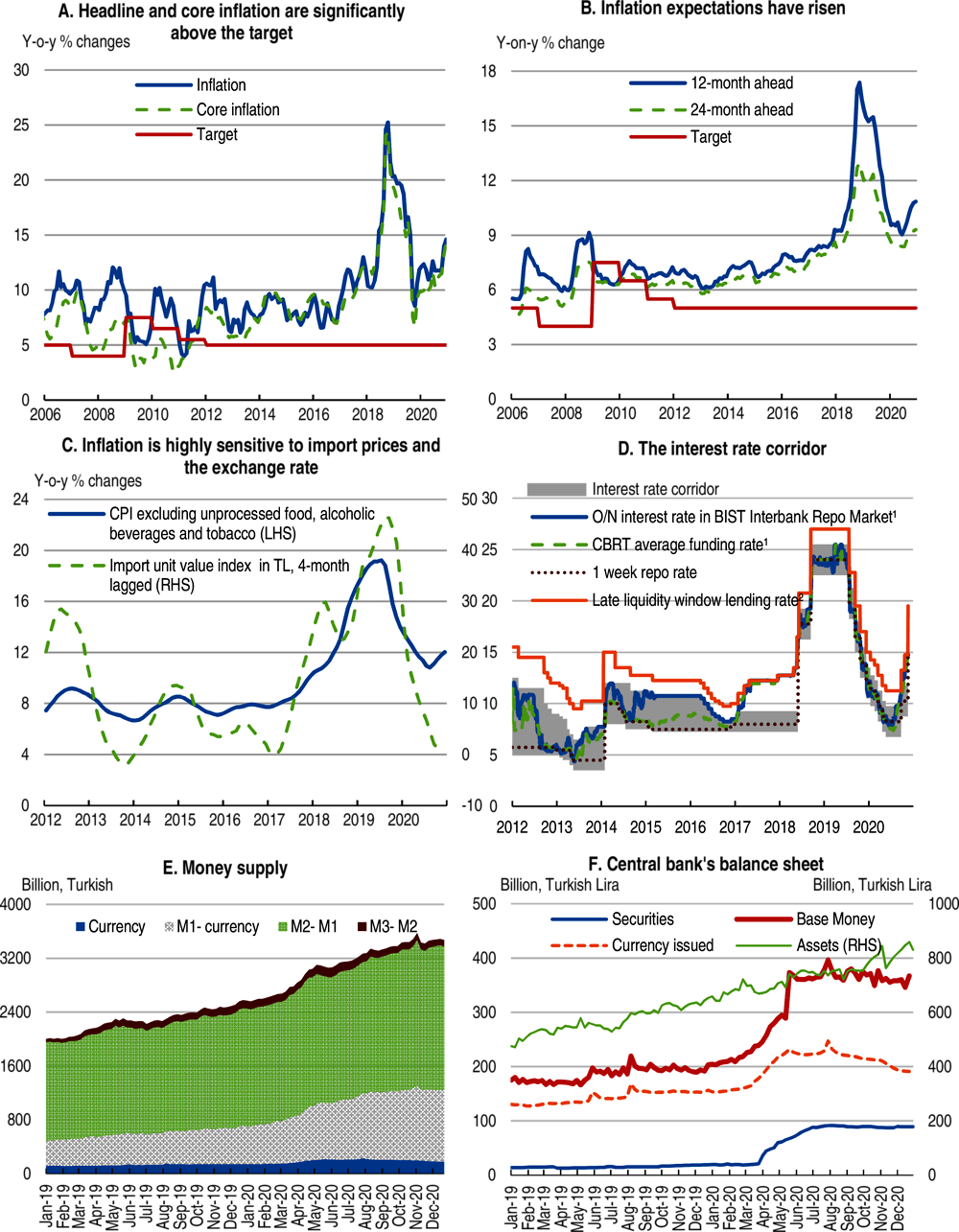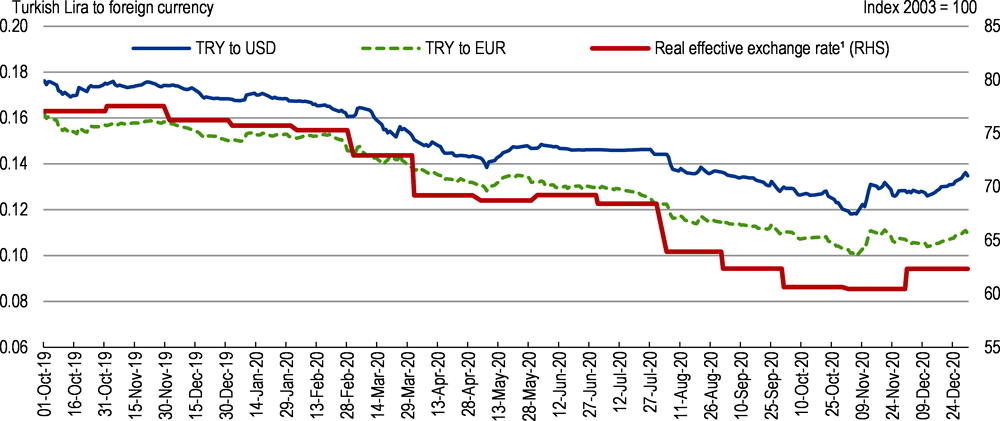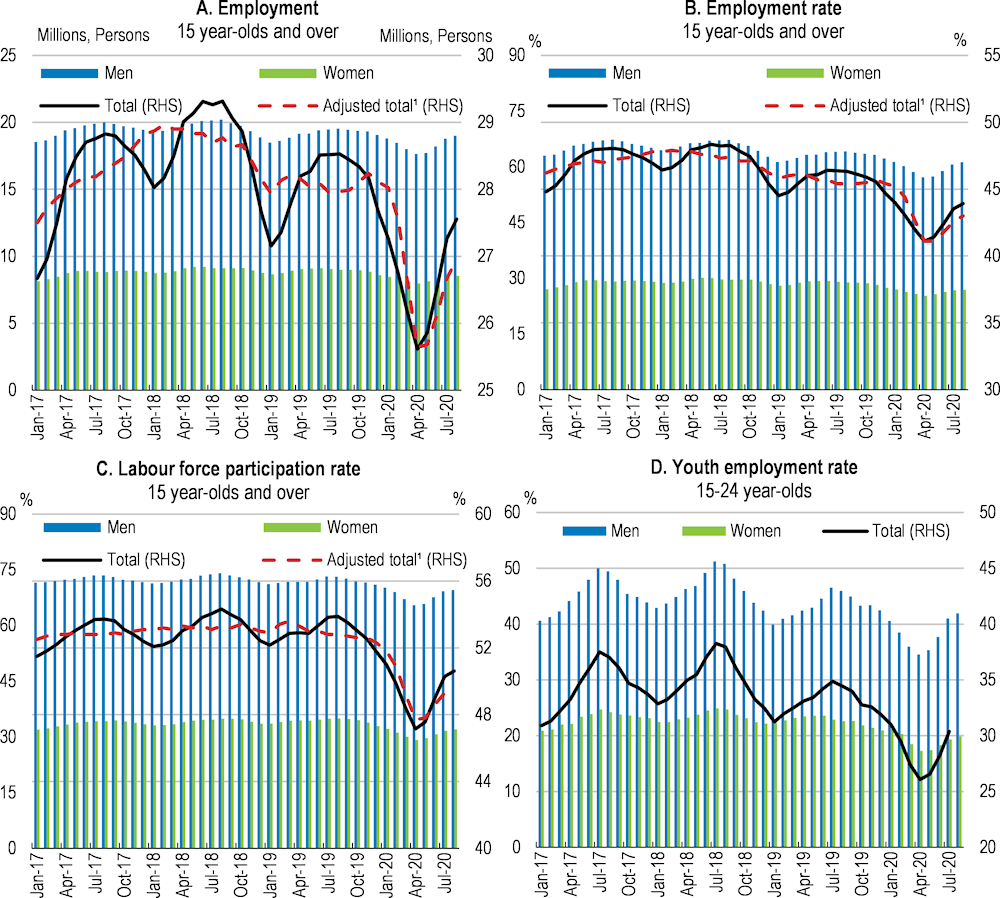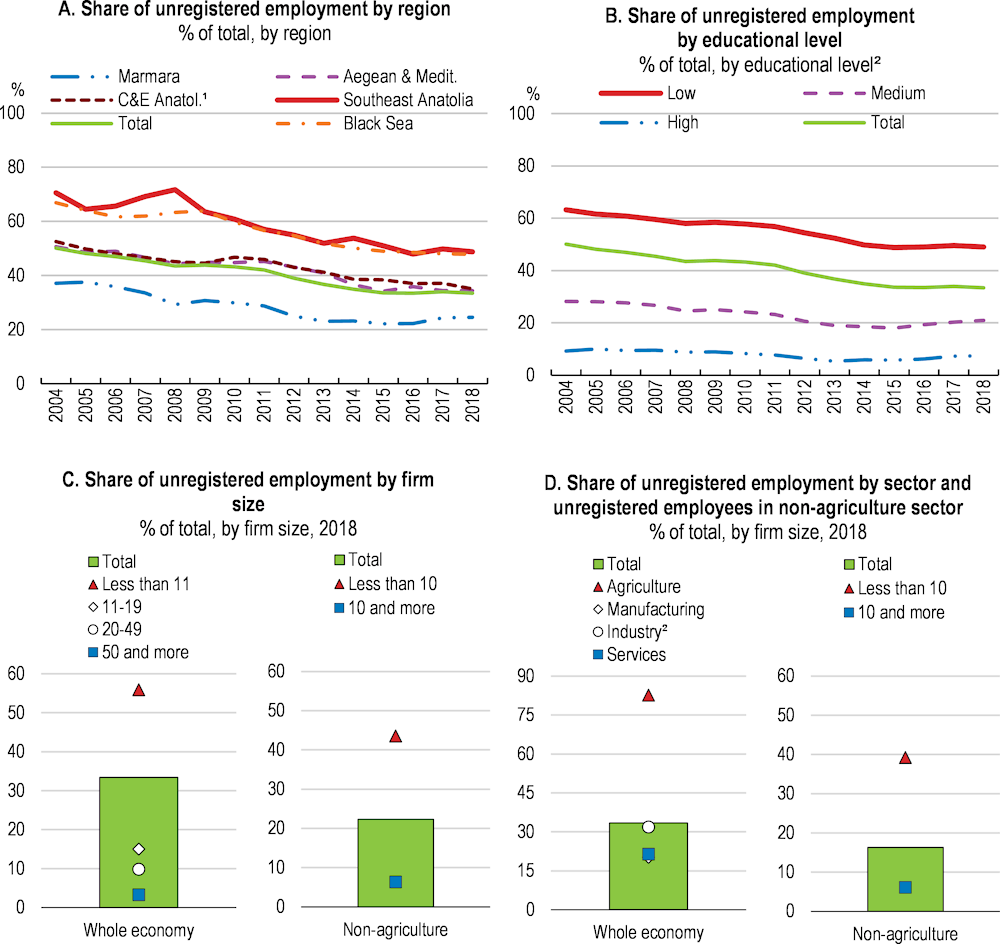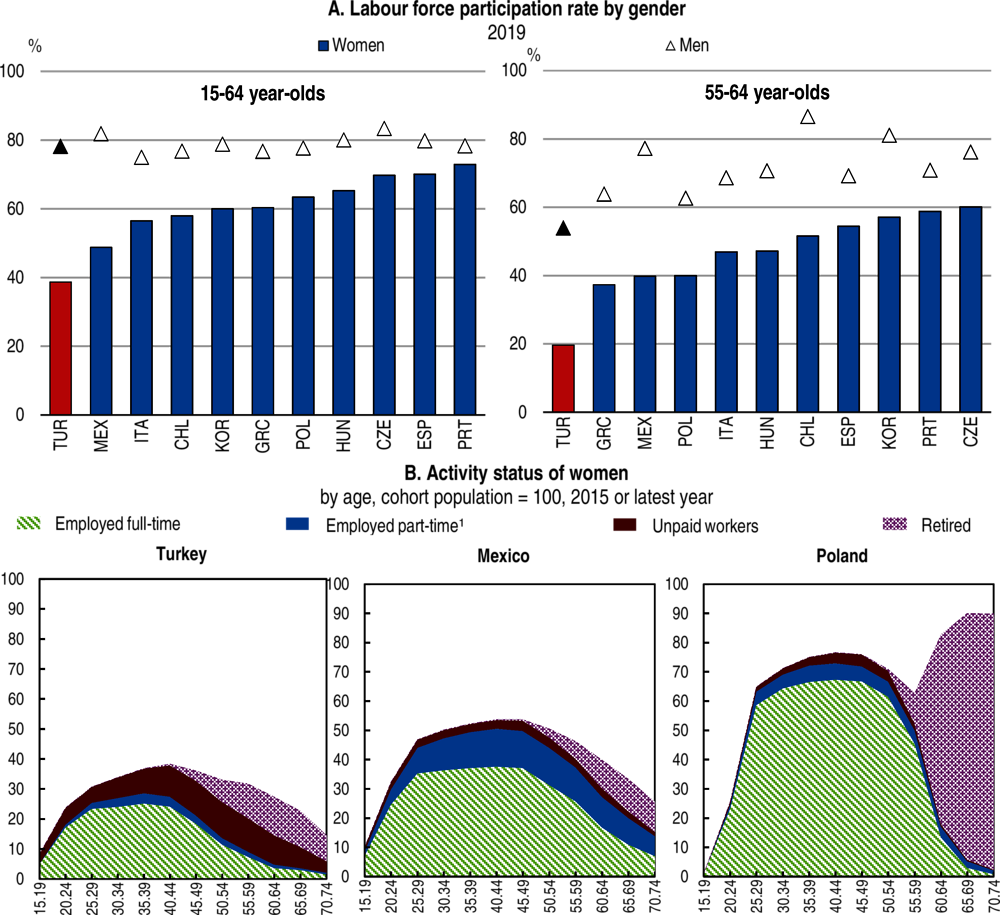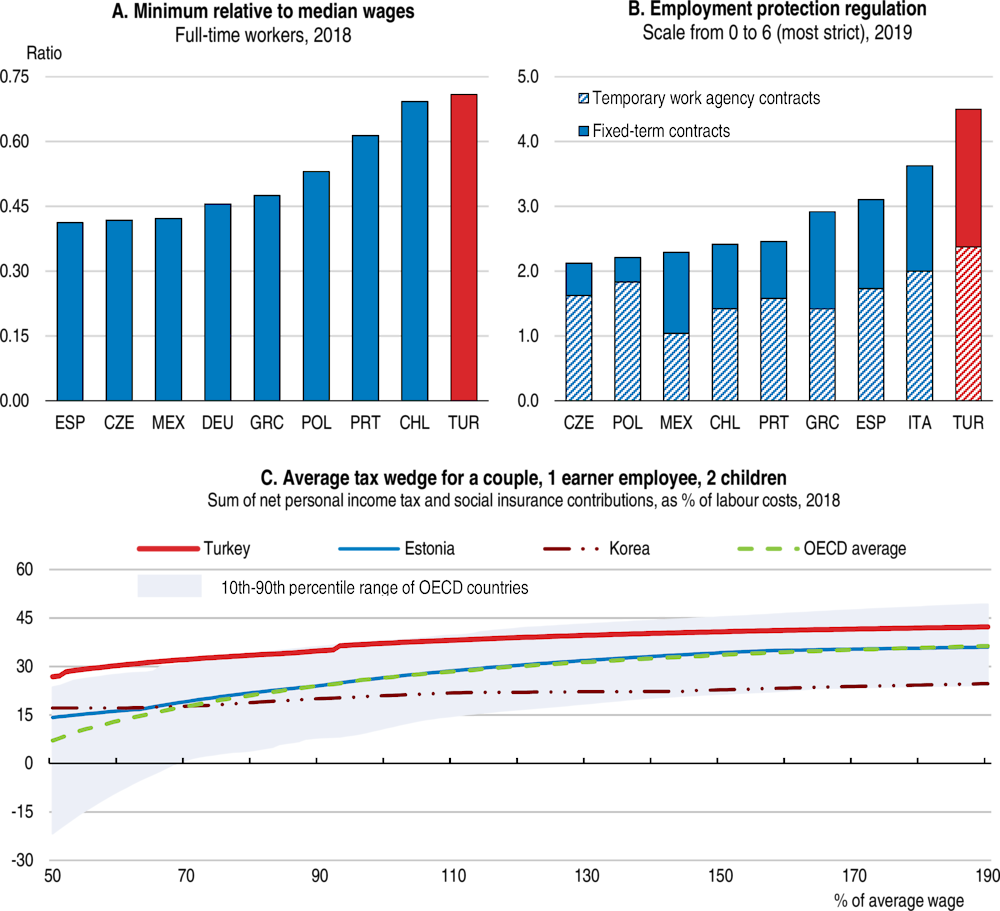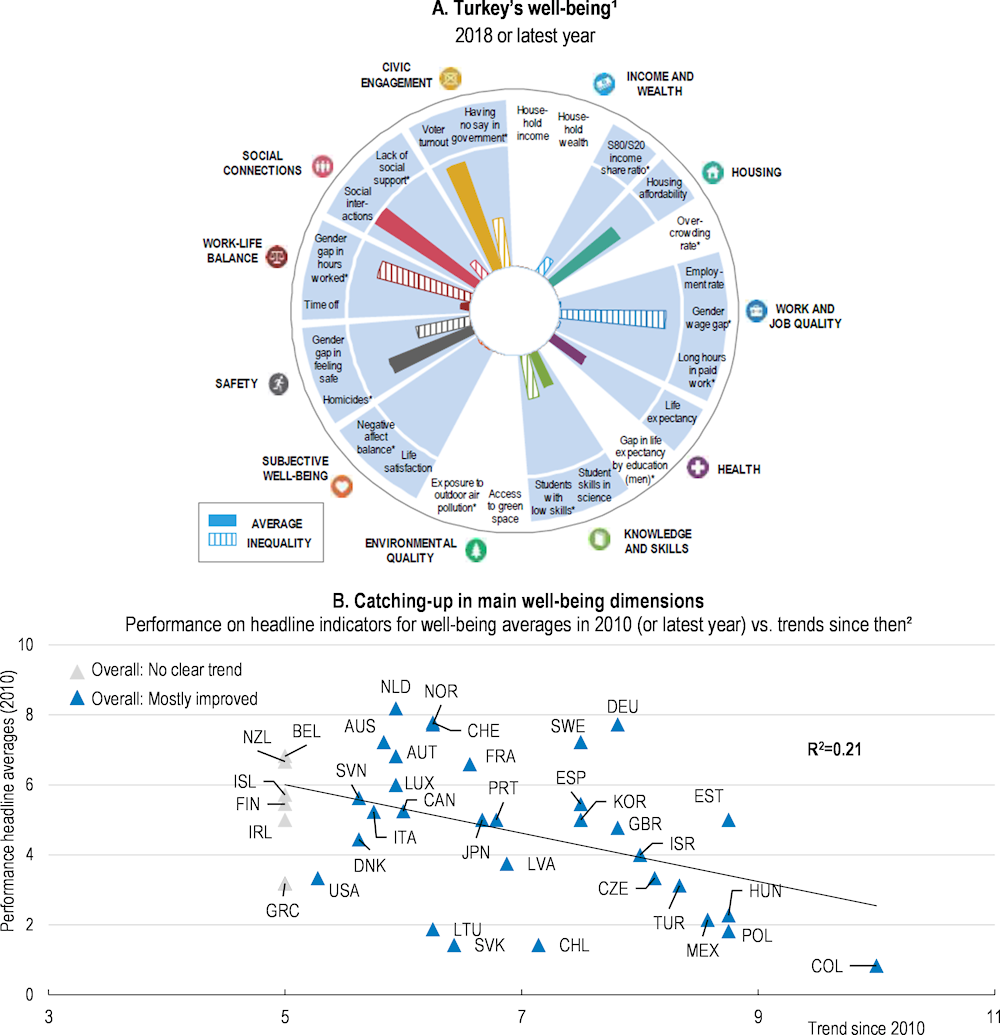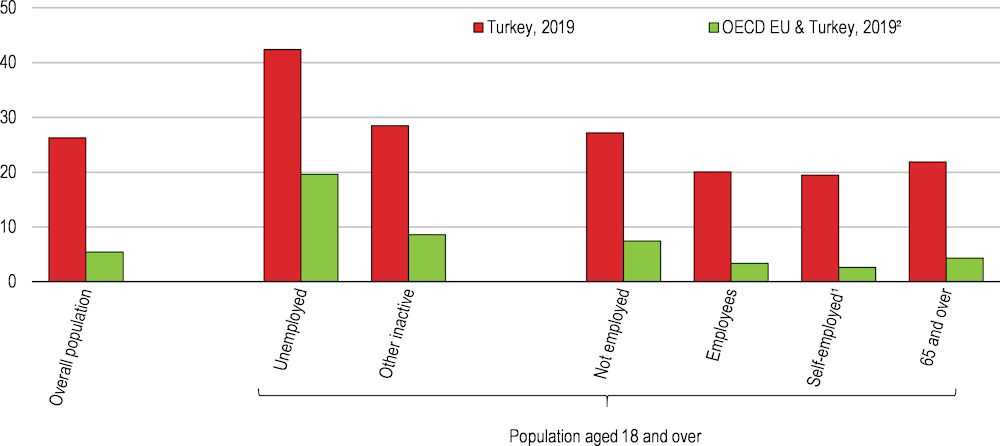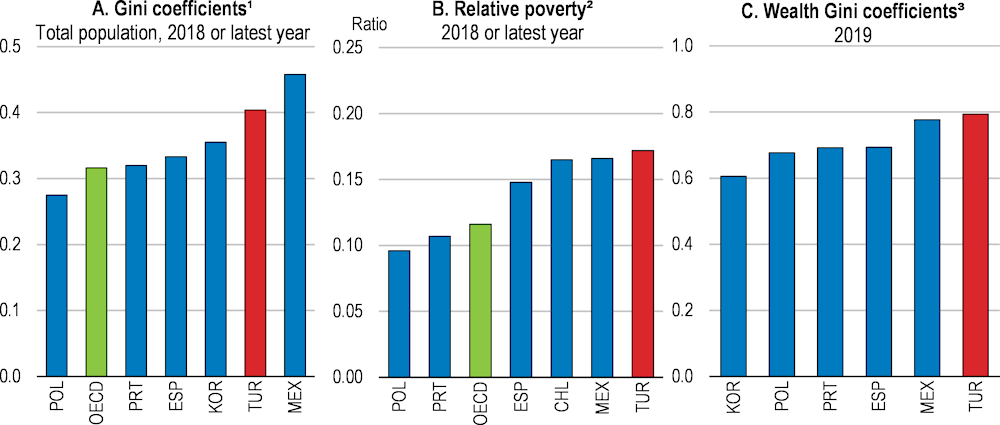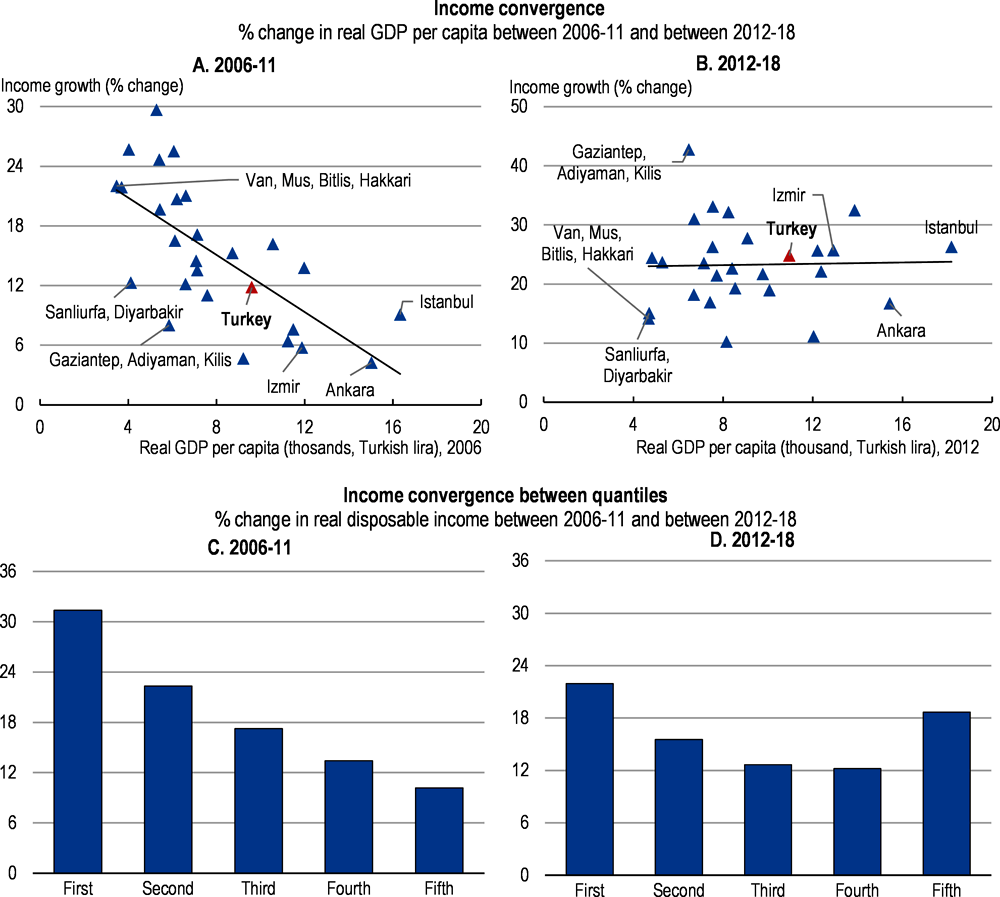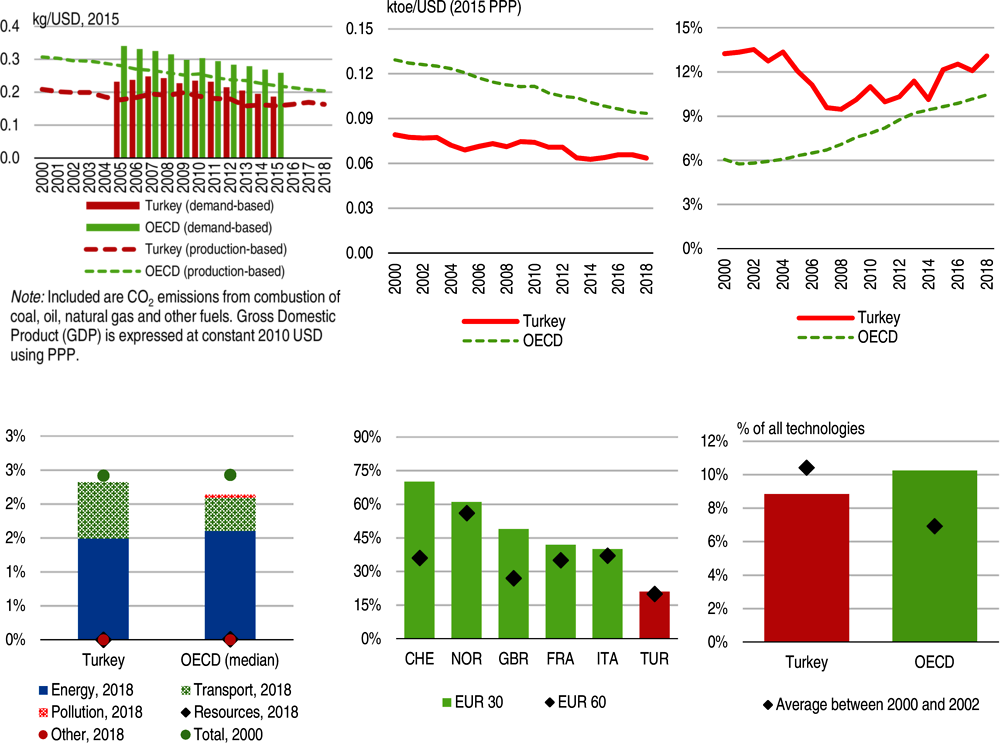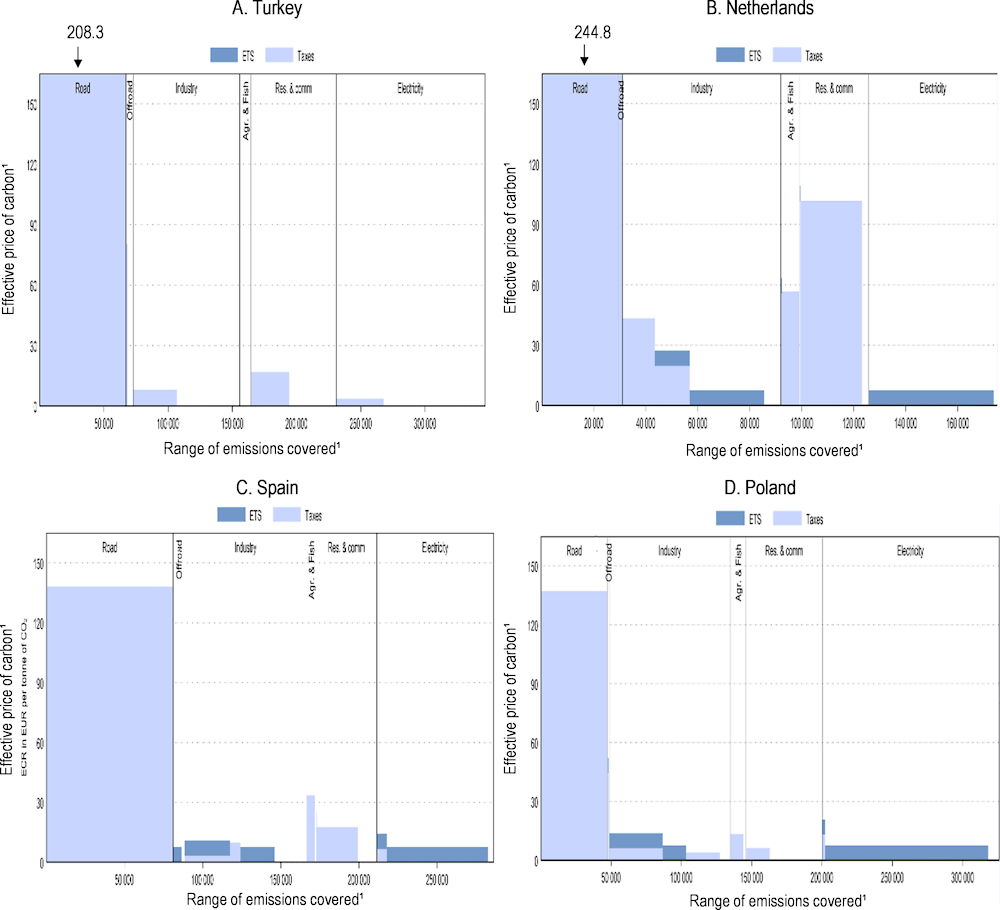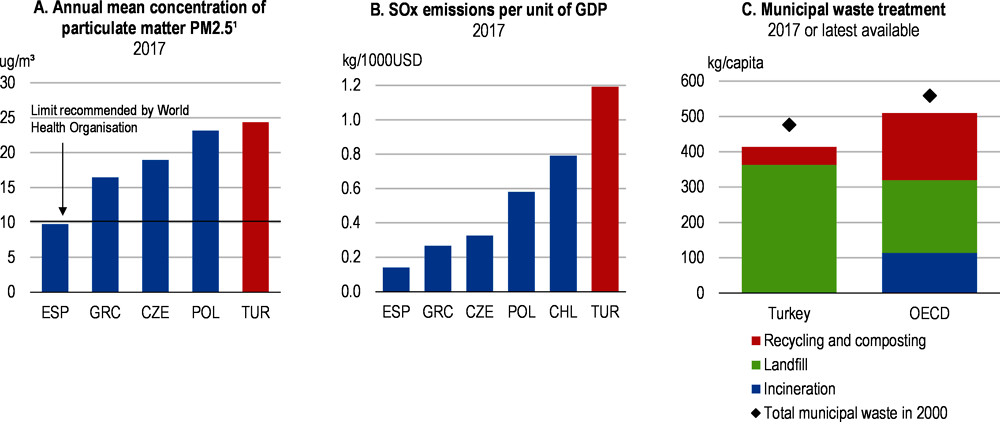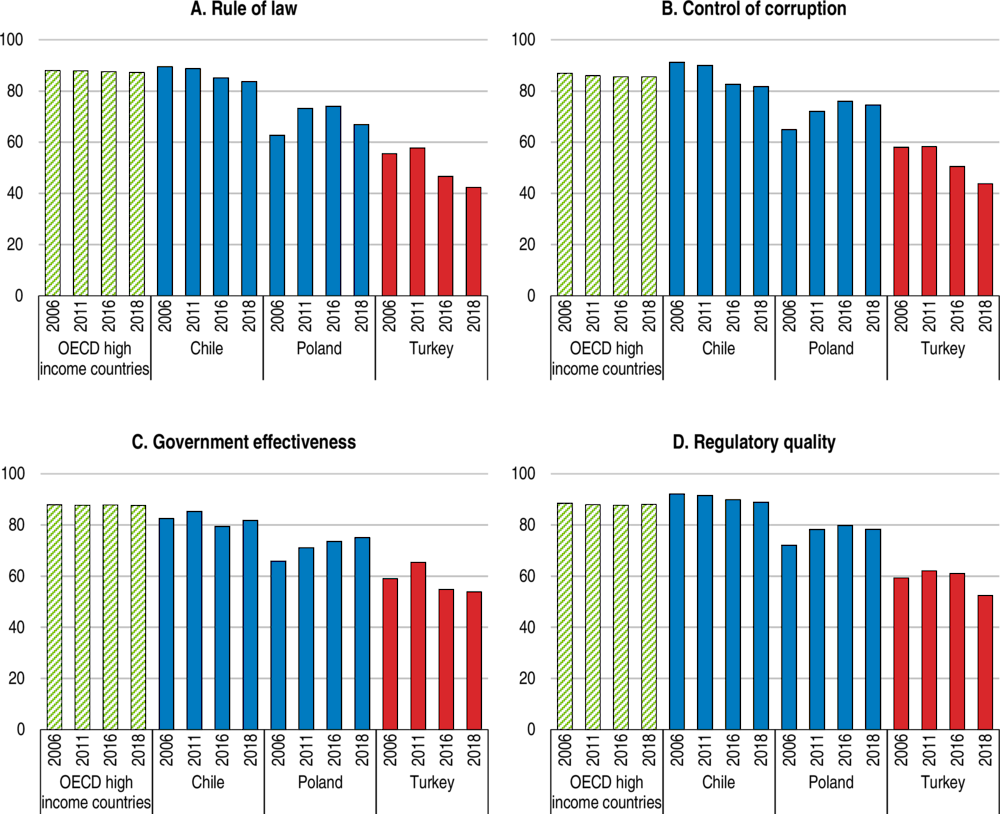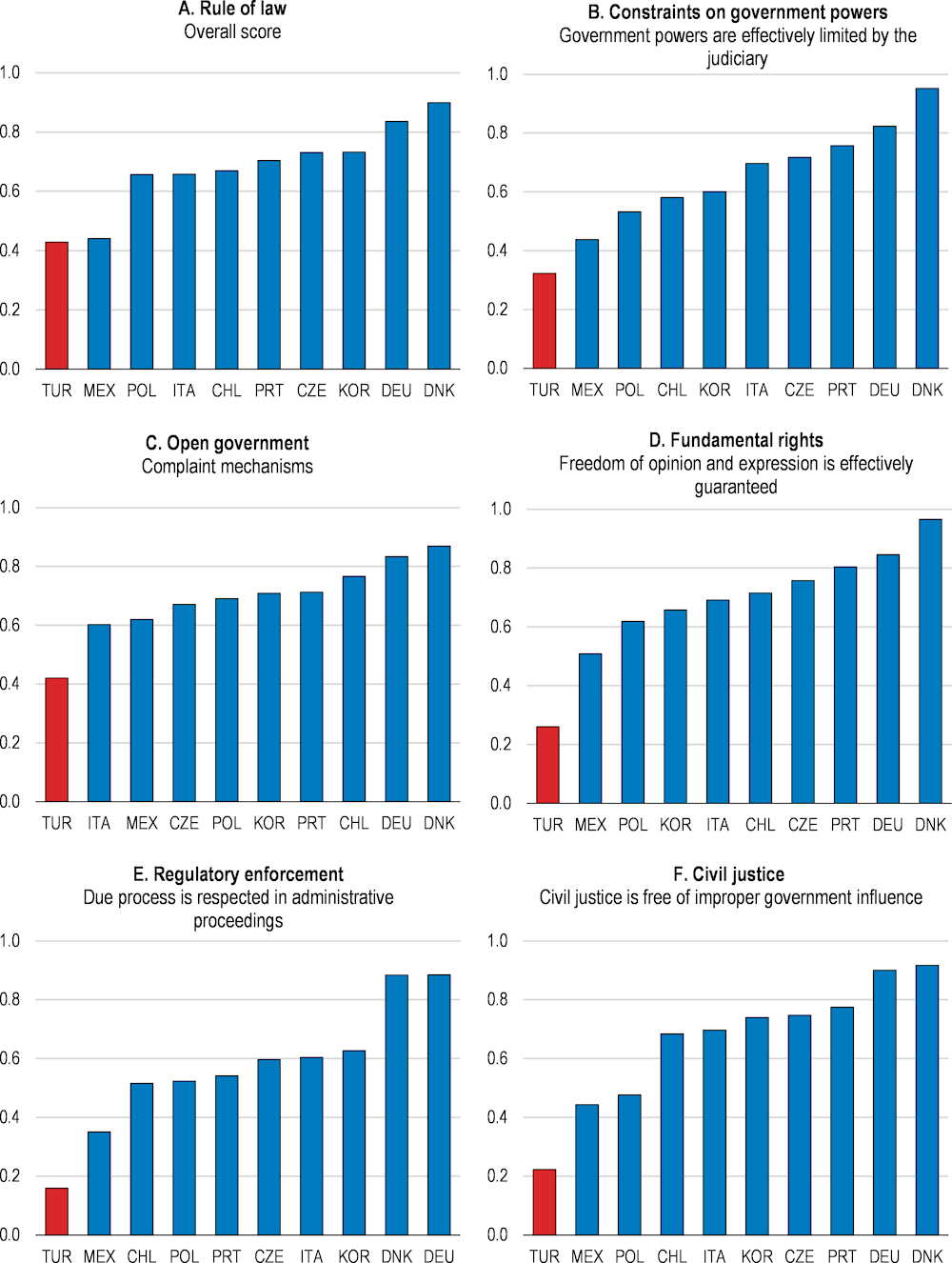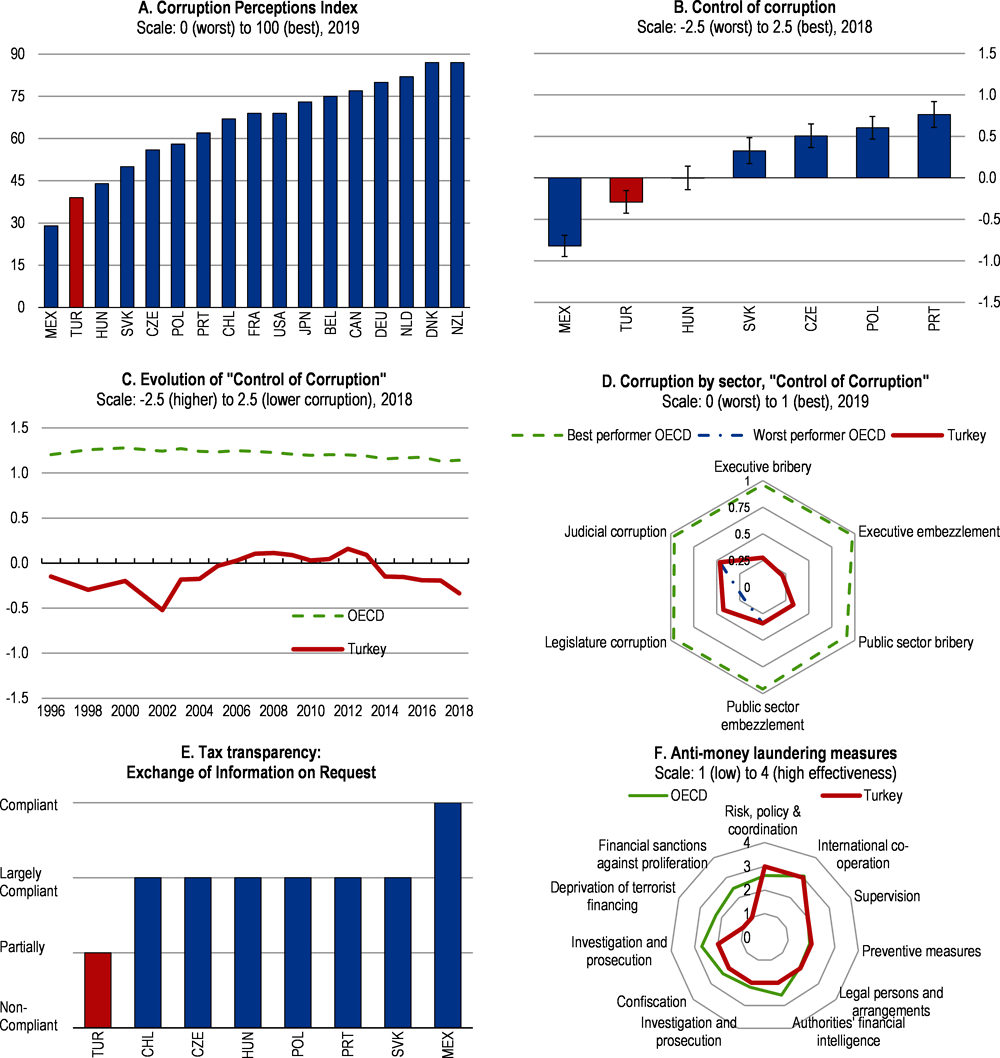Acemoğlu, D. and M. Üçer (2019),”High-Quality Versus Low-Quality Growth in Turkey: Causes and Consequences” CEPR Working Paper, No. DP14070.
Acemoğlu D. and M. Üçer (2020), “The Ups and Downs of Turkish Growth”, unpublished mimeo.
Adar, S. et al. (2020), Customs Union: Old Instrument, New Function in EU-Turkey Relations, SWP Comment, No.48.
Adrian, T. et al. (2020), “A Quantitative Model for the Integrated Policy Framework”, IMF Working Paper, No. 20/122.
Adrian, T. and G. Gopinath (2020), Toward an Integrated Policy Framework for Open Economies, IMF Blog.
Akat A.S and S.Gürsel eds. (2020), Turkish Economy at the Crossroads, World Scientific Publishing.
Akçiğit, U., Y.E. Akgündüz, S.M. Cilasun, S.M., E. Özcan-Tok, E. and F. Yılmaz (2020),”Facts on Business Dynamism in Turkey”, European Economic Review, Vol. 158.
Akçiğit, U. and Y. E. Akgündüz (2020), ‘’Turkiye´de COVID-19 Odakli Talep Şoklarinin Cografi ve Sektorel Yayilimi’’, Working Paper, Chicago University.
Akgündüz, Y.E., Aldan, A., Bagır, Y.K. and H. Torun (2019), “Job mobility in Turkey”, Central Bank Review, Vol. 19/3, pp. 83-91.
Akman, S. (2020), ‘’Ithalatta Ilave Gumruk Vergileri Ne Anlama Geliyor ?’’, TEPAV Degerlendirme Notu.
Alessi, L. and C. Detken (2018), ‘’Identifying excessive credit growth and leverage’’, Journal of Financial Stability, Vol. 35, pp. 215-225.
Algan, Y, (2018), ‘’Trust and Social Capital’’, in J.E. Stiglitz ed. (2018) For Good Measure, OECD Publishing, Paris.
Alper K., H. Kara and M. Yörükoğlu (2013), “Alternative tools to manage capital flow volatility”, B.I.S. Paper.
Andreasen, E., S. Bauducco and E. Dardati (2019), “Capital Controls and Firm Performance”, Working Paper Series, No. 331/2019, ILADES-UAH,
Ankara Tabip Odasi (2020), Pandemi Butun Agirligi ile Devam Ediyor, Ankara.
Aiyar, S., W. Bergthaler, J.M. Garrido, A. Ilyina, A. Jobst, K. Kang, D. Kovtun, Y. Liu, D. Monaghan, and M. Moretti (2015),”A Strategy for Resolving Europe’s Problem Loans”, IMF Staff Discussion Note.
Ari, A., S. Chen and L. Ratnovski (2020), ‘’COVID-19 and non-performing loans: lessons from past crises’’, Research Bulletin, No.71, European Central Bank.
Atabek Demirhan A. (2020), "Türk Imalat Sanayi Firma Performansi Analizi: Diş Tcaret Faaliyetleri Açisindan Bir Inceleme", in "Uluslararası Ticarette Güncel Konular", İstanbul Kültür Üniversitesi yayınları (forthcoming).
Atiyas, İ., O. Bakış and Y. Orhan (2017),”Firm Dynamics and Job Creation in Turkey – Some Preliminary Results”, Working Paper, Sabanci University.
Avrupa Birliği Başkanlığı (2020), İşçi/İşveren temsilcilerinin bilgilenme, istişare ve katılımcılık sorumluluklarının güçlendirilmesi teklif çağrısı, Ankara.
Aygün, A., M.G. Kirdar and B. Tuncay (2020), ‘’The Effect of Hosting 3.4 Million Refugees on the Health System in Turkey and Infant, Child, and Elderly Mortality Among Natives’’ Koc University-TUSIAD Economic Research Forum Working Paper Series, No. 2014.
Bagir, Y. K. (2018), ‘’Impact of the Syrian Refugee Influx on Turkish Native Workers’’, Central Bank Review, Vol. 18/4, pp. 129-147.
Bankovic, A. (2019), Potential for the Future: Renewable Energy Investments in Turkey, EEL Events Blog.
BBVA Research (2020), Turkey GDP is slumped but beat market expectations, 31 August, (Link).
BBC News (2020a), Yuz yuze egitim; Egitimciler kademeli olarak ilerleyecek surec icin ne diyor?, (Link).
BBC News (2020b), Tukenen saglik calisanlari topluca istifa ediyor, (Link).
Benigno et al. (2020), Credible emerging market central banks could embrace quantitative easing to fight COVID-19, CEPR.
Bircan, C. and O. Saka (2019), ‘’Lending cycles and real outcomes: costs of political misalignment’’, Working Paper, No. 225, EBRD.
Bloom, N. and J. van Reenen (2010),”Measuring and Explaining Management Practices across Firms and Countries”, Journal of Economic Perspectives, Vol. 24 (1).
Boeri, T. et al. (2019), “Wage Equalization and Regional Misallocation: Evidence from Italian and German Provinces”, Discussion Paper Series, No. 12279, IZA Institute of Labor Economics.
BRSA (2020a), Press Release (About Asset Ratio), Banking Regulation And Supervision Agency, (Link)
BRSA (2020b), Press Release (About Derivative Transactions), Banking Regulation And Supervision Agency, (Link)
BIS (2017), Supervisory and bank stress testing; range of practices, Banking Regulation And Supervision Agency, (Link).
Çakmakli C. and S. Demiralp (2020), “A Dynamic Evaluation of Central Bank Credibility”, Koç University-TUSIAD Economic Research Forum Working Papers.
CBRT (2019a), Monetary and Exchange Rate Policy for 2020, Central Bank of the Republic of Turkey.
CBRT (2019b), Financial Stability Report November 2019, Central Bank of the Republic of Turkey.
CBRT (2020b), Financial Stability Report November 2020, Central Bank of the Republic of Turkey.
CBRT (2020a), House Price Index: September 2020, Central Bank of the Republic of Turkey.
Ceritoglu, E. et al. (2017), ‘The Impact of Syrian Refugees on Natives' Labor Market Outcomes in Turkey: Evidence from a Quasi-Experimental Design’, CBRT Working Papers, No. 17/05.
Cilasun S., R. Gönenç, U. Özmen, Z. Samancıoǧlu, F. Yilmaz and V. Ziemann (2019), “Upgrading business investment in Turkey”, OECD Economics Department Working Papers, No. 1532.
Citibank (2020), CEEMEA Economics: Turkey Economics, 17 March.
Cherif, R. and F. Hasanov (2019),”The Return That Shall Not Be Named: Principles of Industrial Policy”, IMF Working Paper, WP/19/74.
Council of Europe/GRECO (2018), Fourth Evaluation Round: Corruption prevention in respect of members of parliament, judges and prosecutors, Compliance Report Turkey, (Link).
Council of Europe/GRECO (2020), Plenary Meetings, (Link)
Cournède, B., J. Fournier and P. Hoeller (2018), ‘’Public finance structure and inclusive growth’’, Economic Policy Paper, No. 25, OECD Publishing, Paris.
Corporate Sustainability and Responsibility Europe (2020), The European Green Deal and Turkey, (Link).
Çetinkaya, Ö. (2014). “Kamu İhale Kanunu ve Yolsuzluk Riskleri”. Bursa: Ekin Yayınevi.
Çetinkaya, Ö., E. Eroğlu (2020),”An Assessment of the Public Procurement System in Turkey”, Public Financial Management Reforms in Turkey: Progress and Challenges, Vol. 1.
Çolak et al. (2019), ‘’Monitoring and Forecasting Cyclical Dynamics in Bank Credits: Evidence from Turkish Banking Sector’’, Working Paper, No. 19/29, CBRT.
Del Carpio, X., and T. Taskin (2019),”Quality of Management of Firms in Turkey”, Jobs Working Paper No. 27, World Bank.
Demiralp S. (2020), “The Economic Impact of the COVID-19 on Turkey”, Middle East Institutte, (Link).
Demiralp S., H. Kara and P. Özlü (2012), “Monetary policy communication in Turkey”, European Journal of Political Economy, December.
Deutsche Welle (2020a), Pandemi Doneminde Turkiye´de Gocmen ve Multeciler, (Link).
Dünya (2018), Turizmin digital gelecegi Antalya´da konusuldu, (Link)
Dusundere, A.T. and I.A. Koyuncu (2020), ‘’Yeni Ilave Gumruk Vergileri Turkiye icin Ne Ifade Ediyor?’’
TEPAV, Degerlendirme Notu.
EBA (2020), Milli Egitim Bakanligi Egitim Bilisim Agi, (Link).
Ecofys (2016), “Roadmap for the Consideration of Establishment and Operation of a Greenhouse Gas Emissions Trading System in Turkey”, Report for the Ministry of Environment and Urbanisation, (Link).
Eğilmez, M. (2020a), Merkez Bankası Rezervlerinin Yeterliliği, Blog.
Eğilmez, M. (2020b), Genc Issizlik Orani, Blog.
Estevão, M. and G. Everaert (2016), Enhancing Monetary Policy Flexibility Through `De-dollarization’, IMF Blog.
EpiForecasts (2020), Covid-19 Reproduction Number Estimates for Turkey, (Link).
Ergun, D., O. Gouveia and A. Ortiz (2017), International experiences of De-dollarization: What could be done in the Turkish case?, BBVA Research.
Erdogdu, E. (2013), ‘’Motor fuel prices in Turkey’’, MPRA Paper, No. 55521.
Egitimsen (2020), Salgin Gunlerinde Uzaktan Egitim Çalistayi Sonuc Raporu, 4 Eylul 2020.
Ernst & Young (2020a), Turizm Sektoru Degerlendirmesi 2020 Raporu, (Link).
Ernst & Young (2020b), Tourism Market Overview, Turkey & Istanbul, (Link).
Euronews (2020b), Turkiye´de kayit disi calisirken issiz kalan multeciler icin yardim cagrisi, (Link).
European Bank For Reconstruction and Development (2020), COVID-19; From Shock to Recovery, Regional Economic Prospects, (Link)
European Commission (2017), “Effectiveness of tax incentives for venture capital and business angels to foster the investment of SMEs and start-ups”, Final Report TAXUD/2015/DE/330.
European Banking Authority (2020), EU-wide stress testing, (Link).
European Commission (2019), Key findings of the 2019 Report on Turkey, (Link).
European Commission (2020), Key findings of the 2020 Report on Turkey, (Link).
EEA (2018), European Environment Agency Report on Air Quality in Europe 2018, (Link)
EEA (2019), European Environment Agency Turkey Air Pollution Country Fact Sheet 2019, (Link)
Faccio, M. (2006),”Politically Connected Firms”, The American Economic Review, Vol. 96 (1).
FATF (2019), “Anti-money laundering and counter-terrorist financing measures in Turkey”, Financial Action Task Force, (Link).
Gevrek, Z.E., P. Kunt and H.W. Ursprung (2019), ‘’Education, Political Discontent, and Emigration Intentions; Evidence from a Natural Experiment in Turkey’’, CEsifo Working Papers, No. 7710.
Gürakar, E. Ç. (2016), Politics of Favoritism in Public Procurement in Turkey: Reconfigurations of Dependency Networks in the AKP Era, Palgrave Macmillan.
Gaspar, V., M. Muhleisen and R. Weeks-Brown (2020), Corruption and COVID-19, IMF Blog.
Gaspar, V. and G. Gopinath (2020), Fiscal Policies for a Transformed World, IMF Blog.
Geomar (2019), Istanbul: Seafloor study proves earthquake risk for the first time, (Link).
Goldman Sachs (2020), CEEMEA in Focus: Turkey, 7 February.
Gönenç, R., S. Şahinoz and Ö. Tuncel (2010), ‘’Turkey´s Improving Integration with the Global Capital Market: Impacts on Risk Premia and Capital Costs’’, OECD Economics Department Working Papers, No. 812.
Gönenç, R. (2017), “The Middle-Income Plateau: Trap or Springboard?, OECD Economics Department Working Papers, No. 1446.
Gül, S. (2019). “Institutional Quality and the Sovereign Risk Premia: Cross Country Evidence”, Unpublished mimeo, Ankara.
Gül, S. (2020a). “Sovereign Risk and Local Currency Lending Rates: Evidence from Five OECD Countries”, CBRT Research Notes in Economics (forthcoming), Central Bank of the Republic of Turkey.
Gül, S. (2020b). “Determinants of Debt Dollarization for NFCs: Does the Institutional Quality Matter?”, CBRT Research Notes in Economics (forthcoming), Central Bank of the Republic of Turkey.
Gürsel S. and G. Uysal (2020), «Korona Gunlerinde Turkiye Isgucu Piyasasi », in O.F.Çolak ed. (2020) « Korona Krizinde Turk Ekonomisi », Elif Yayinlari (forthcoming).
Hacettepe University (2019), “Suriyeli Göçmen Örneklemi Temel Bulgular”, Nufus Etutleri Enstitusu, (Link)
Huizinga, H. and L. Laeven (2019), ‘’The Procyclicality of Banking: Evidence from the Euro Area’’, Discussion Paper Series, No. 13605, CEPR.
International Labour Organisation (2020), COVID-19 crisis and the informal economy: Immediate responses and policy challenges, (Link).
IMF (2019), 2019 Article IV Consultation with Turkey.
IMF (2020), 2020 External Sector Report: Global Imbalances and the COVID-19 Crisis.
Irwin, D.A. (2020), ‘’The Rise and Fall of Import Substitution’’, Working Paper, No. 27919, NBER.
Istanbul Buyuksehir Belediyesi (2020), Internet Erisiminde En Buyuk Sorun Pahalilik, (Link).
Kadir Has University (2020), Turkiye Egilimleri-2019 (M. Aydin et al.), (Link).
Kara H., T. Tiryaki and C. Yüksel (2014), “In Search of a Reasonable Credit Growth Rate for Turkey,” Central Bank Review 14 (1).
Kirisçi, K., and B. Yavcan (2020), “As COVID-19 worsens precarity for refugees, Turkey and the EU must work together”, Brookings, (Link)
KPMG (2020), Perakende Sektorel Bakis, (Link).
Mehr News Agency (2020), Turizm gelirlerinin üçte birine düşmesi büyümeyi 4 puan indirebilir, (Link).
Ministry of Development (2018), Saglik Hizmet Kalitesi ve Mali Surdurulebilirlik, 11th Development Plan (2019-2023), Report of the Special Commission, (Link).
Ministry of Environment and Urbanisation (2020), Ulusal Hava Kalite Izleme Ağı, (Link).
Ministry of Family, Labor and Social Services of Turkey (2020a), Isyerlerinde COVID-19 ile Mucadele, (Link).
Ministry of Treasury and Finance (2020), New Economy Programme 2021-2023.
Ministry of Treasury and Finance (2020a), Debt Indicators.
Mimir, Y. and E. Sunel (2019), ‘’External Shocks, Banks, and Optimal Monetary Policy: A Recipe for Emerging Market Central Banks’’, International Journal of Central Banking, Vol. 15/2, pp. 235-299,
National Geographic (2020), “Turkey has been contact tracing for a century. That offers lessons and perils”, (Link)
OECD (1997), Convention on Combating Bribery of Foreign Public Officials in International Business Transactions, OECD Publishing, Paris.
OECD (2008), OECD Guidance on Sovereign Wealth Funds, (Link).
OECD (2010), OECD Economic Surveys: Turkey 2010, OECD Publishing, Paris.
OECD (2012), Recommendation of the Council on Regulatory Policy and Governance, OECD Publishing, Paris.
OECD (2013), Supporting Investment in Knowledge Capital, Growth and Innovation, OECD Publishing, Paris.
OECD (2014), Phase 3 Report on Implementing the OECD Anti-Bribery Convention in Turkey, OECD Publishing, Paris.
OECD (2015), Taxation of SMEs in OECD and G20 Countries, OECD Tax Policy Studies, No. 23, OECD Publishing, Paris.
OECD (2015b), Opportunities and Constraints of Market-Based Financing for SMEs, OECD Report to G20 Finance Ministers and Central Bank Governors.
OECD (2015c), OECD Guidelines on Corporate Governance of State-Owned Enterprises, OECD Publishing, Paris.
OECD (2016), OECD Economic Surveys: Turkey 2016, OECD Publishing, Paris.
OECD (2017),”Enhancing The Contributions of SMEs in a Global and Digitalised Economy”, Meeting of the OECD Council at Ministerial Level, Paris 2017.
OECD (2017), OECD Recommendation on Disaster Risk Financing Strategies, OECD Publishing, Paris.
OECD (2017b), Turkey Follow Up-To The Phase 3 Report & Recommendations, OECD Publishing, Paris.
OECD (2018), Latin American and Caribbean Competition Forum: The Informal Economy in Latin America and the Caribbean: Implications for Competition Policy, Background Note.
OECD (2018a), OECD Economic Surveys: Turkey 2018, OECD Publishing, Paris.
OECD (2018b), Good Jobs for All in a Changing World of Work, OECD Publishing, Paris.
OECD (2018c), OECD Strategic Approach to Combating Corruption and Promoting Integrity, OECD Publishing, Paris.
OECD (2019a), PISA 2018 Country Note: Turkey (Link).
OECD (2019b), “R&D Tax Incentives: Turkey, 2019”, Directorate for Science, Technology and Innovation, December, (Link).
OECD (2019c), OECD Pensions Outlook, OECD Publishing, Paris.
OECD (2019d), OECD leading multilateral efforts to address tax challenges from digitalisation of the economy, (Link). OECD (2019d), Pensions at a Glance 2019: OECD and G20 Indicators, OECD Publishing, Paris.
OECD (2019e), “Turkey’s foreign bribery enforcement framework needs to be urgently strengthened and corporate liability legislation reformed”, (Link).
OECD (2019f), OECD Family Database: Child poverty, (Link).
OECD (2019g), OECD Environmental Performance Reviews: Turkey 2019, OECD Environmental Performance Reviews, OECD Publishing, Paris. OECD (2019h), OECD leading multilateral efforts to address tax challenges from digitalisation of the economy, (Link).
OECD (2020), OECD Employment Outlook 2020: Worker Security and the COVID-19 Crisis, OECD Publishing, Paris.
OECD (2020a), “Corporate sector vulnerabilities during the Covid-19 outbreak: assessment and policy responses”, Tackling Coronavirus Series.
OECD (2020b), “Insolvency and debt overhang following the COVID-19 outbreak: assessment of risks and policy responses”, Tackling Coronavirus Series (forthcoming).
OECD (2020c), Coronavirus Country Policy Tracker: Turkey, (Link).
OECD (2020d), “Testing for COVID-19: A way to lift confinement restrictions”, Policy Responses To Coronavirus, (Link)
OECD (2020e), Capacity for Remote Working Can Affect Lockdown Costs Differently Across Places, Policy Responses To Coronavirus (Link).
OECD (2020f), OECD Code of Liberalisation of Capital Movements, (Link).
OECD (2020g), Job retention schemes during the COVID-19 lockdown and beyond, Tackling Coronavirus Series.
OECD (2020h), Capacity for remote working can affect lockdown costs differently across places, OECD Policy Responses to Coronavirus, (Link).
OECD (2020i), The OECD Jobs Strategy: Implementation Highlights for Korea.
OECD (2020j), How´s Life? 2020, OECD Publishing, Paris.
OECD (2020k), OECD Family Database: Intimate Partner Violence Indicators, (Link).
OECD (2020l), Making the green recovery work for jobs, income and growth, Policy Responses to Coronavirus.
OECD (2020m), Competition Assessment Toolkit, (Link).
OECD (2020n), OECD Economic Surveys: Costa Rica 2020, OECD Publishing, Paris.
OECD/ETF/EU/EBRD (2019), “SME Policy Index: Western Balkans and Turkey 2019: Assessing the Implementation of the Small Business Act for Europe”, SME Policy Index, OECD Publishing, Paris.
Oyak Yatirim (2020), Gelecek 12 ayda beklenen kârlara göre hesaplanan fiyat kazanç oranları, (Link).
Özlale, Ü. and B. Polat (2019),”Understanding Firm Dynamics and Job Creation In Turkey Using the Entrepreneur Information System Database”, TÜSİAD – Sabancı Üniversitesi Rekabet Forumu Working Paper No: 2019-2,.
Özatay, F. (2019), ‘’Mind the Gap: Debt Limit and Fiscal Stimulus Debt Limit’’, TEPAV Working Paper, No. 201901.
Özmen U. (2019) “Economic Complexity and Sovereign Risk Premia”, Economics Bulletin, Vol (39) 3.
P.A. Turkey (2020), Shoping mall stores debating closure, (Link)
Presidency of Strategy and Budget (2019), Eleventh Development Plan 2019-2023, Ankara.
Reuters (2019), Turkey must step up measures against money laundering, watchdog says,
Reuters (2020a), Turkey has only been publishing symptomatic coronavirus cases, (Link)
Reuters (2020b), Turkey's coronavirus cases total 1.749 million since outbreak began, (Link)
Sameks (2020), Satinalma Mudurleri Endeksi, Kasim 2020, MUSIAD (Link)
Sayan S. (2020), “Cari açık ilelebet payidar kalacak mı?”, TEPAV Arastirma Notu.
Sak G. and F. Özatay (2020), “What If Turkey Imposes a Curfew Due To COVID-19 ? », TEPAV Arastirma Notu.
SWF (2008), International Forum of Sovereign Wealth Funds Santiago Principles, (Link).
Swiss Re (2015), Risky Cities; Istanbul, (Link).
Swiss Re (2018), Risky Cities; earthquake resilience in Istanbul, (Link).
Tükel H. (2020), “COVİD 19 ve Türkiye’de İş Piyasası”, SEDEFED Uzman Görüşü Notu, October (Link).
Trading Economics (2020), Turkey Households Debt to GDP Ratio, (Link).
Tümen, S. (2019), ‘’The Effect of Refugees on Native Adolescents´ Test Scores; Quasi-Experimental Evidence from PISA’’, Economic Research Forum Working Paper, No. 1356.
Turkstat (2020), Uluslararasi Göç Istatistikleri: 2019, (Link).
Turkish Medical Association (2020a), ‘’Saglik calisanlarinin COVID-19 virusune maruz kalimina iliskin risk degerlendirmesi anketinin on raporu’’, (Link).
Turkish Medical Association (2020b), Hekimlerin Istifasi Yasaklandi mi? (Link).
Türk-Iş (2019), Suriyeliler ve Turkiye Isgucu Piyasasina Etkileri, (Link).
Türkonfed (2020), Dijital Liderler ve KOBI’ler donusum seminerleri, (Link).
TVF (2019), Turkey Wealth Fund and its subsidiaries, consolidated statement of financial position at 31 December 2019, (Link).
TVF (2020), The Mandate of the Turkey Wealth Fund (Link).
United Nations (2019), International migrant stock 2019: Country Profiles, (Link).
Webrazzi (2020a), Covid-19 salgini e-ticaret ve altyapi talebini nasil degistirdi? (Link).
Webrazzi (2020b), Türkiye'de e-ticaret yüzde 39 büyüyerek 83,1 milyar lira oldu, (Link).
World Bank (2014),”Evaluation of the EU - Turkey Customs Union”, (Link).
World Bank (2020),”COVID-19 Outbreak: Implications on Corporate and Individual Insolvency”, COVID-19 Notes Finance Series, World Bank Group.
WTO (2019), Global Value Chain Development Report 2019: Technological Innovation, Supply Chain Trade and Workers in a Globalised World, Lausanne.
World Justice Project (2019), Rule of Law Index 2019. (Link).
Yarba, İ., Z. N. Güner (2019),”Leverage dynamics: Do financial development and government leverage matter? Evidence from a major developing country”, Empirical Economics, May 2019.
Yilmaz, H.H. and S. Tosun (2010), 5018 Sayılı Kanun Çerçevesinde Mali Saydamlık ve Parlamentonun Bütçe Sürecinde Etkinliği, Yasama Dergisi 14.


